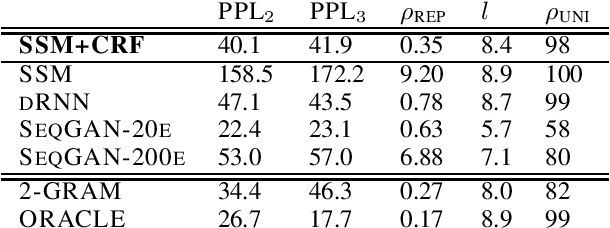Autoregressive Text Generation Beyond Feedback Loops
Paper and Code
Aug 30, 2019

Autoregressive state transitions, where predictions are conditioned on past predictions, are the predominant choice for both deterministic and stochastic sequential models. However, autoregressive feedback exposes the evolution of the hidden state trajectory to potential biases from well-known train-test discrepancies. In this paper, we combine a latent state space model with a CRF observation model. We argue that such autoregressive observation models form an interesting middle ground that expresses local correlations on the word level but keeps the state evolution non-autoregressive. On unconditional sentence generation we show performance improvements compared to RNN and GAN baselines while avoiding some prototypical failure modes of autoregressive models.
 Add to Chrome
Add to Chrome Add to Firefox
Add to Firefox Add to Edge
Add to Edge